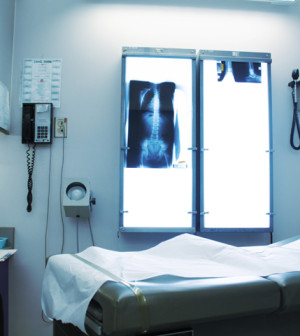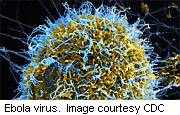- Could Artificial Sweeteners Be Aging the Brain Faster?
- Techniques for Soothing Your Nervous System
- Does the Water in Your House Smell Funny? Here’s Why
- Can a Daily Dose of Apple Cider Vinegar Actually Aid Weight Loss?
- 6 Health Beverages That Can Actually Spike Your Blood Sugar
- Treatment Options for Social Anxiety Disorder
- Understanding the Connection Between Anxiety and Depression
- How Daily Prunes Can Influence Cholesterol and Inflammation
- When to Take B12 for Better Absorption and Energy
- Epsom Salts: Health Benefits and Uses
Inhalable Ebola Vaccine Works in Monkeys


An inhalable Ebola vaccine protected monkeys against the deadly virus, a new study shows.
Research suggests that the linings of the airways may be an important point of entry for the Ebola virus into the body. This was the first test of a inhalable Ebola vaccine, the researchers said.
“A needle-free, inhalable vaccine against Ebola presents certain advantages. Immunization will not require trained medical personnel,” study author Michelle Meyer said in a University of Texas Medical Branch (UTMB) at Galveston news release. Meyer is a postdoctoral fellow in its pathology department.
She and her colleagues found that the inhalable vaccine protected rhesus macaque monkeys against severe illness and death when they were exposed to the Ebola virus.
The findings were published July 13 in the Journal of Clinical Investigation.
“This study demonstrates successful aerosol vaccination against a viral hemorrhagic fever for the first time,” study senior author and virologist Alex Bukreyev, a professor at UTMB, said in the news release.
“A single-dose aerosol vaccine would enable both prevention and containment of Ebola infections, in a natural outbreak setting where health care infrastructure is lacking or during bioterrorism and biological warfare scenarios,” he added.
The researchers will apply for approval to conduct human clinical trials of the inhalable Ebola vaccine.
More information
The U.S. Centers for Disease Control and Prevention has more about Ebola.
Source: HealthDay
Copyright © 2026 HealthDay. All rights reserved.










